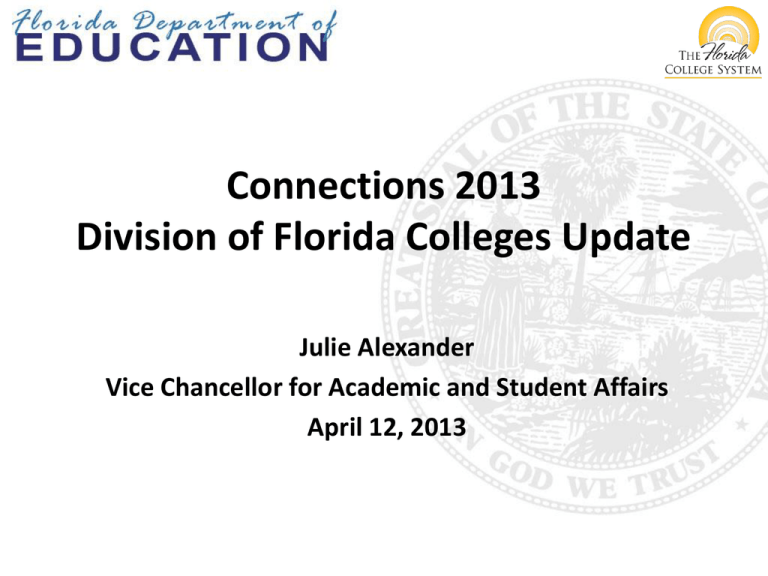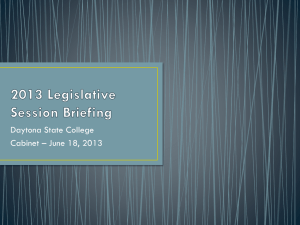State Policy & Division Update - Florida Department of Education
advertisement

Connections 2013 Division of Florida Colleges Update Julie Alexander Vice Chancellor for Academic and Student Affairs April 12, 2013 Topics • • • • 2012 Legislation Implementation 2013 Proposed Legislation Upcoming Activities Good news for the Florida College System • Questions 2012 Legislation Implementation • General Education Core Courses • 30-Hour Advising • Foreign Language General Education Core Course Options • Institution feedback under review • Proposed legislation – Maintain 36 hours – Institution does not have to offer all core course options – Timeline – Additional core courses General Education Core Course Options Initial Faculty Draft Recommendations Mathematics MAC X105 Communications ENC X101 Social Science Natural Science Humanities PSY X012 BSC X005 ARH X000 STA X023 SYG X000 CHM X020 HUM X020 MGF X106 WOH X040 PHY X020 LIT X100 MGF X107 CPO X001 ESC X000 MUL X010 ANT X000 EVR X001 PHI X010 Senate Bill 1720 The core courses maybe revised or the fivecourse cap within each subject area maybe exceeded if approved by the State Board of Education and the Board of Governors, as recommended by the subject area faculty committee and approved by the Articulation Coordinating Committee, as necessary for a subject area. 30-Hour Advising • Beginning with the 2013-2014 academic year • By the time the student accumulates 30 college credits – The student must • Identify a baccalaureate institution and program of interest – The college must • Advise the student of the common prerequisites Foreign Language • Beginning with 2014-2015 • First-time-in-college Associate in Arts (AA) degree seeking • Demonstrate foreign language competency – 2 sequential courses in high school OR – 2 sequential college credit courses 2013 Proposed Legislation • High School Diploma Designations • Dual Enrollment • Developmental Education Senate Bill 1076: High School Diploma Designations • Scholar Designation – Meet Standard Diploma, plus • • • • Algebra II and statistics Chemistry or physics Foreign language At least one credit in acceleration mechanism • Merit Designation – Meet Standard Diploma, plus • One or more industry certifications House Bill 5101: Education Funding, Dual Enrollment When dual enrollment is provided on the high school site by postsecondary institution faculty, the school district shall reimburse the costs associated with the proportion of salary and benefits and other actual costs of the postsecondary institution to provide the instruction. When dual enrollment is provided on the high school site by school district faculty, the school district shall be responsible only for the postsecondary institution's actual costs associated with offering the program. A postsecondary institution may enter into an agreement with the school district to authorize teachers who teach dual enrollment courses at the high school site or the postsecondary institution. A school district may not deny a student access to dual enrollment unless the student is ineligible to participate in the program subject to provisions specifically outlined in this section. House Bill 7057 & Senate Bill 1720: Developmental Education • • • • • • Both bills require major reforms Many provisions are similar Building on work already started Senate Bill 1720 passed this week House Bill 7057 has not yet passed House and Senate will reconcile differences Senate Bill 1720 House Bill 7057 Similarities Meta-Majors, State Board by October 1, 2013 Meta-Majors, State Board by July 1, 2014 Supplemental Attributes such as GPA, etc. for Supplemental Attributes for Placement, Local Using Placement, State Board Data Supported Student Attributes Developmental Education Options Notification and Developmental Education Options Notification and Counseling, Tutoring, Extended Time in Gateway, Counseling, Tutoring, Extended Time in Gateway, Free Online Courses Free Online Courses Differences Definitions Definitions Developmental Education Co-Requisite, No Developmental Education Strategies: Tuition Acceleration, Modularization, Contextualization Acceleration, Modularization, Contextualization Florida College System Institution Shall Implement Policies for Direct Enrollment in College Credit State Board Rules to Implement Developmental Florida College System Institution Submit Plan to Education, January 1, 2014 Chancellor for Approval, Implementation no later than 2015-16 Course Repeat – Full Cost of Instruction Except Extended Gateway Course Report Developmental Education Annual Cost Annual Accountability Report Submitted to Accounting System Governor Facts • 2010-11, 176,286 individuals enrolled in at least one developmental course – 171,269 developmental mathematics courses – 70,933 developmental reading courses – 71,967 developmental writing courses • Students of all ages enroll in developmental education – Recent high school graduates were least likely to need developmental education (14% under 20 years of age) – Nearly 4 out of 10 developmental students were 25 years of age and over – Nearly one-half of developmental students were between 20 and 24 years of age • Recent high school graduates were the only age group to show decreases in developmental education Upcoming Activities • Developmental Education Massive Open Online Course (MOOC) Grant Opportunity • Dual Enrollment Toolkit Grant Awarded to College of Central Florida • Financial Literacy Toolkit Grant Awarded to Broward College • Postsecondary Education Readiness Test (PERT) Algebra I End-of-Course (EOC) Concordance Score & Standard Setting smart-college-choices.com Economic Impact The total effect of the Florida College System on the Florida economy, based on student productivity gains, college operations, and student spending, is $26.6 billion. Questions







